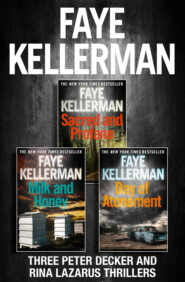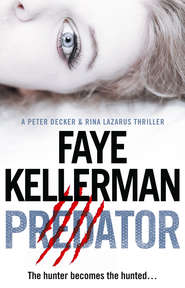По всем вопросам обращайтесь на: info@litportal.ru
(©) 2003-2024.
✖
The Forgotten
Настройки чтения
Размер шрифта
Высота строк
Поля
“You don’t sound like any Cajun I ever met,” Webster said.
“The original Acadians came from Canada—Nova Scotia specifically.” Holt gave off a practiced smile. It was condescending and ugly. “I am proud of my heritage, which is why I feel so strong about preserving cultural purity. And it has nothing to do with racism, because as you can see for yourself …” He pointed to his hair and nose. “I have black blood in me.”
“So you admit to being a mutt,” Webster said.
Holt bristled. “I am not talking about bloodlines, I’m talking ethnicity. My ethnicity is Acadian and it is my wish to preserve my ethnic purity. It is our opinion that the mixing of ethnicities has ruined civilization and certainly the individualization and pride of too many cultures. Immigration has turned everything into one big amorphous blob. Look at cuisine! You go out to a French restaurant when you’re in the mood for French food. Or perhaps a Mexican restaurant when you want enchiladas. Or Italian or American or Southern or Tunisian whenever you want the various cuisines. Imagine what it would be like if you mixed up all these nuances, all the flavors. Individually they work; together, they’d make for one horrible stew.”
“We are not beef Stroganoff, sir,” Martinez said. “Food isn’t the issue. Crime is the issue. Vandalism is a crime. What happened today at the synagogue constitutes a hate crime. The vandals will be found, and they will be punished. So if you know something, I suggest you get a load off now. Because if we come back, it’s going to be bad for you.”
“You have us all wrong.” Holt picked up a handful of leaflets and handed them to Martinez. “You’ll probably throw them away. But should you care to enlighten yourself enough to give us a fair shake, you’ll see that what we say makes a lot of sense.”
Erin broke in. “We have all kinds of members.”
“All kinds of ethnicities,” Holt added. “We cater to the disenfranchised.”
“Like who?” Martinez asked.
“Read our flyers. Our members write the articles.” He plunked a few from the table. “This one—on the ills of affirmative action—was written by an African-American, Joe Staples. This one is on English as a second language in America, written by an ex-Marine turned psychologist.” He focused in on Martinez. “Mr. Tarpin is just elucidating a well-known point. That in the United States we have only one official language and that language is English. If you read it, you’ll see that he has nothing against Hispanics. Everyone who lives in the U.S. should speak English.” He smiled. “Just like you’re doing right now.”
“I’m glad Mr. …” Martinez looked at the flyer. “Mr. Tarpin would approve of my English skills.”
“Which makes sense, being as Detective Martinez is American,” Webster stated. “Which means, if you’re Canadian, Mr. Holt, Detective Martinez is more of an American than you are. And if you advocate people staying with their own kind, maybe you should go back to Canada.”
Webster was florid with fury, his hands bunched into fists. Martinez, on the other hand, was completely impassive, glancing at Mr. Tarpin’s words on why English was such a wonderful, expressive, and large language. That was certainly true enough. Compared to Spanish’s blooming buds, English was an entire bouquet of flowers because it used words from a variety of other languages. The irony was lost on the author.
Martinez said, “Did you print these flyers yourself?”
“The PEI did. Absolutely.”
“Things were left behind in the synagogue,” Martinez said. “Nazi slogans that were printed on flyers just like these.”
“There’s a Kinko’s about a mile away from here,” Holt retorted. “Why don’t you ask them about it?”
Webster said, “And if we were to download your computer files, we wouldn’t find neo-Nazi groups bookmarked on your favorite places?”
“No, you would not,” Holt said confidently. “But even if you did find anything you deem as offensive, it still proves nothing. I did not vandalize anything!”
“There were also photographs left behind at the temple,” Martinez said. “Horrible pictures of holocaust victims—”
“That’s terrible,” Erin piped up. “That’s not our thing.”
“What is your thing?”
“Erin, I’ll handle this,” Holt said.
She ignored him. “Our thing is keeping ethnic identity pure. Gosh, we do it with animals—purebred this and purebred that. So what’s so wrong about wanting people to stay pure? You call it racism, but like Darrell stated, we are not racists! We are preservationists. We have nothing against Jews as long as they stick with Jews, and stop controlling the stock market—”
“Erin—”
“I’m just saying what Ricky says. He says the Jews control all the computers. Just look at Microsoft!”
“Erin, the head of Microsoft is William Gates III,” Holt said. “Does that sound like a Jewish name?”
“No.”
“That’s because William Gates III is not Jewish. If Ricky told you that, Ricky is full of shit!”
Erin’s mouth formed a soft O.
“Who’s Ricky?” Martinez asked.
“Some jerk …” Holt made a face at Erin. “Why do you bring him up?”
“You said he was your friend. Didn’t you go to Berkeley together?”
Holt rolled his eyes. To the cops, he said, “Ricky Moke is to the right of Hitler. Why don’t you go hassle him?”
“Where can we find him?”
“That’s a good question,” Erin said. “He hides out a lot.”
“Erin, shut up!”
“Don’t yell at me, Darrell. You were the one who gave the cops his last name.”
“Is this Moke a fugitive?”
Erin and Darrell exchanged glances. Holt said, “Moke tells lots of stories. Among them is this tale about his being a wanted fugitive.”
“What is Moke supposedly wanted for?”
“Bombings.”
The cops exchanged glances.
“Bombing what?” Webster asked. “Synagogues?”
Holt shook his head. “Animal laboratories. Not the actual cages, just the data centers. Ricky, by his own admission, is an animal lover.”
4 (#u0f746847-02e6-5495-8ba5-4f5ec129c6fa)
Torah Academy of West Hills had been molded from an old veterinary clinic. It must have been a thriving practice, and for big animals, because the examination rooms were extra large though still too small for classrooms. So the majority of actual learning took place in prefab trailers that filled the parking lot, save for a few science classes that were held in the animal morgue. The other clinic rooms had been turned into offices for the administration. Decker knew that the school, like everything in this community, was run on hope, volunteers, and the occasional out-of-the-blue donation.
Rabbi Jeremy Culter was in charge of secular studies. He was in his mid-thirties, and considered very modern for an Orthodox rabbi. In addition to being ordained as a rabbi, he had a Ph.D. in education and, most telling, he didn’t have a beard. He was fair complexioned and on the short side—trim with very long and developed arms. His office held a minimal look—a desk, a couple of chairs, and a bookshelf filled with sepharim—Jewish books—as well as books on psychology, sociology, and philosophy. The walls were cedar-paneled and still retained a faint antiseptic odor, along with an occasional waft of urine.
Usually, when Decker visited the school, he wore a yarmulke—a skullcap. But today he was there not as a father but in an official capacity. He didn’t wear a yarmulke when he worked because he often dealt with people who hated him in particular and cops in general, and he didn’t want to give any psycho-felon anti-Semite any more fodder to use against Jews. Still, sitting in front of Culter, he felt exposed without a head covering. If Culter noticed, he didn’t let on.
He said, “I can’t believe you actually think that one of our own boys—your son’s classmates—desecrated a shul and left concentration-camp photos around? Children with grandparents who are survivors!”











